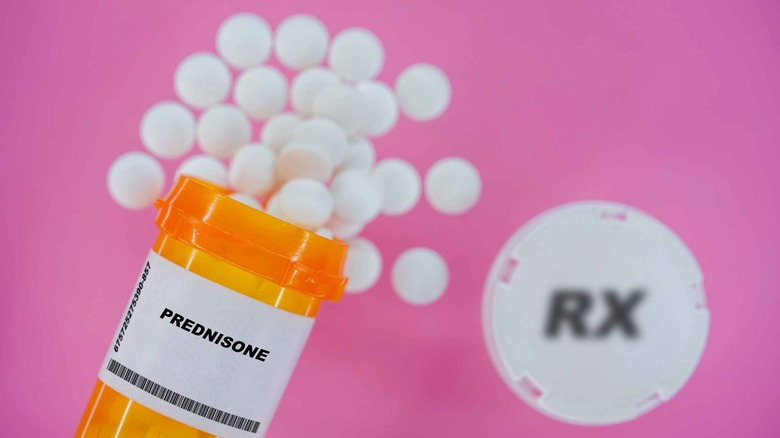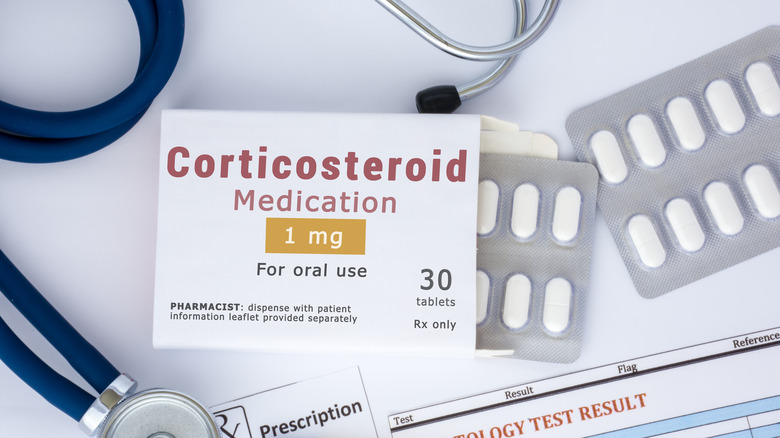Is It Safe To Take Prednisone If You Have High Blood Pressure?
If you're diagnosed with high blood pressure, also known as hypertension, one thing your doctor may do is prescribe medication to keep the symptoms under control (via WebMD). The intent is to bring down your blood pressure efficiently and with the least amount of side effects. As the patient, you should ask your doctor as many questions as possible about what he or she is prescribing and what the side effects might be.
In addition to the potential side effects presented by the medication you're prescribed, there are also risks posed by what may already be in your medicine cabinet. A 2018 study published in the American Journal of Hypertension showed that many common medications were interfering with patients' hypertension treatments. The study profiled more than 500,000 adults who were taking medication to combat high blood pressure. Of those, 18% were taking medications that decreased the efficacy of their hypertension medication, including non-steroidal anti-inflammatory drugs, acetaminophen, and hormones.
Similarly, a 2021 study by the American College of Cardiology found that many of these medications, which also include antipsychotics and birth control pills, may actually be raising patients' blood pressure numbers. According to the study, stopping the use of one of these medications could improve blood pressure rates by nearly 5%. These findings lead one to wonder what the effects might be of taking steroids like prednisone while on high blood pressure medication.
How prednisone impacts blood pressure
Prednisone is a corticosteroid drug that resembles the hormone cortisol, which your body produces naturally, according to Cleveland Clinic. The primary function of corticosteroids is to reduce inflammation and slow the reaction of your body's immune system, which can sometimes not function properly due to certain conditions. According to the Mayo Clinic, prednisone is used to treat inflammation in the body, as well as a wide range of ailments, including stomach and bowel problems, lupus, ulcerative colitis, and multiple sclerosis flare-ups.
Prednisone is not without its side effects, one of which can be high blood pressure, explains Harvard Medical School. This happens because corticosteroids like prednisone cause fluid retention in the body. That excess fluid in the circulatory system leads to an increase in blood pressure.
Another symptom of prednisone use is weight gain, due to the drug's mimicking of cortisol, which alters your metabolism and increases your appetite (via Drugs.com). That increased appetite can lead to weight gain, which, in turn, will raise your blood pressure.
Keeping your doctor in the loop
If you are currently taking medication for hypertension and are prescribed prednisone for another condition, be sure to talk with your doctor beforehand, advises Drugs.com. He or she may decide to adjust your medication and continue to monitor your blood pressure to see how you react to prednisone. Additionally, if you do not have hypertension, but notice a spike in blood pressure while on prednisone, your doctor may put you on medication until the symptoms come under control.
If you begin taking prednisone, regardless of your blood pressure, be sure to be on the lookout for certain symptoms (via the Hospital for Special Surgery). Watch for swelling in your ankles, which could be a sign of fluid retention, and have your blood pressure checked regularly. If symptoms persist, your doctor may consider a low-sodium diet or prescribe diuretics until things begin to subside. Regular monitoring of your pressure and check-ins with your doctor can go a long way towards enabling you to take prednisone while keeping your blood pressure under control.



